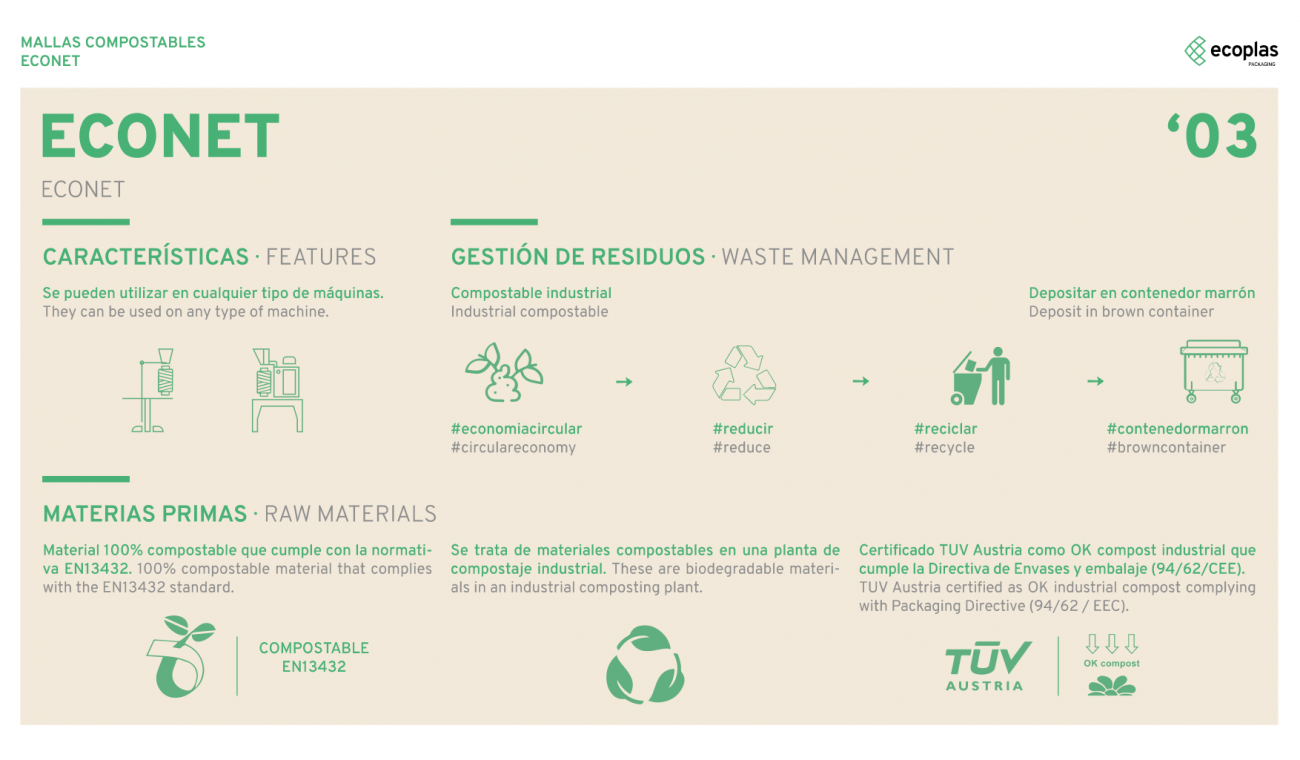The new Law on Waste and Contaminated Soils includes, among some measures, the creation of a tax of 0.45 euros per kilo on non-reusable plastic containers and others, deposited in landfills. This increase in the final weight of plastic products, which are already taxed at 21% VAT, represents a discriminatory legal action that will affect all consumers and in a greater proportion those with fewer resources and will reduce the competitiveness of the Spanish product in the Foreign. Given the uncertainty that the approval of this new Law on Waste and Contaminated Soils is generating and its possible impact on the meshes for packaging food products, Ecoplas proposes R-NET a sustainable solution, adapted to the needs of society and the principles defended by the circular economy.
R – NET: It is a line of products based on the triple R:
Recyclable: All the meshes they manufacture are recyclable and are deposited in the yellow container, thus extending the useful life of the raw material.
Renewables: Raw materials can come from renewable sources such as sugar cane and even obtain the Tuv Austria seal of “Ok Bio-based
Reduce: The use of plastic in manufacturing is reduced, achieving lighter meshes with the same performance
The R-NET meshes are:


Therefore, R-NET has 30% less raw material compared to our competition thanks to our state-of-the-art technology and a strong investment in R + D + I that has allowed us to find a lighter product without losing properties.
This new tax on packaging manufacturers will end up having an impact on their customers (in our case, packers of fruit, garlic, potatoes, seafood, etc.) who in turn will have to pass it on to their customers, which will affect consumers. end, subtracting purchasing power from the consumer who will see how the price of the shopping basket increases.
Here are several examples of what the use of our R-NET meshes can represent for food packaging companies:
- A garlic packer that manufactures 15,000,000 four-headed garlic packages per year in a conventional 10-gram mesh, if we switch to using our R-NET mesh, would save approximately 10,000 euros / year in plastic tax.
- For an onion packer the amount of savings could be doubled, about 20,000 euros / year.
- If we talk about potato packers, the amounts can exceed 50,000 euros / year.
Barely a few weeks have passed since the approval in the Council of Ministers of the new draft Law on Waste and Contaminated Soils and controversy has already been generated among many companies in the plastic sector, where they consider that the Law is disproportionate and a double-edged sword, that may not be able to solve the problem it raises. This is what platforms of the plastic sector such as ESPlásticos denounce in their last article or the ANAIP Association itself, which expresses in a recent publication the discomfort at the approval of the new law that hinders the implementation of the circular economy in the sector itself.
But, what is this new Law on Waste and Contaminated Soils really looking for? Have all the actors involved in it been taken into account? The feeling of the majority of those affected is negative and they think that the economic and environmental consequences have not been assessed. Some objectives are disproportionate, such as the reduction of 50% in 2026 and 70% in 2030 in the consumption of single-use food and drink containers. More realistic is the regulation in Portugal, where less ambitious packaging use reduction targets have been set and all kinds are also included regardless of the material with which they have been manufactured.
Faced with the Portuguese decision, the Spanish one does not favor the progress that is being made in the plastic sector in recycling and in the circular economy. Without forgetting that in the worst case, it can cause an increase in the final weight of the waste generated and greater food waste.
